The AI for Education Awards celebrate and encourage the efforts of teachers, tech pioneers and educational institutions to seize the potential of new technologies. The initiative was launched by Cohort 2023 Fellows Lieselot Declercq, Nassim Benoussaid, Anicet Touré and Louis Wouters as their Field Work project. The group decided to work on making education more inclusive, personal and effective with the power of artificial intelligence. On June 18th, the first edition of the AI for Education Awards was hosted during the Belgian Economic Mission in Oslo, Norway, a milestone in the Field Work group’s journey to create a lasting impact to integrate technology into learning.
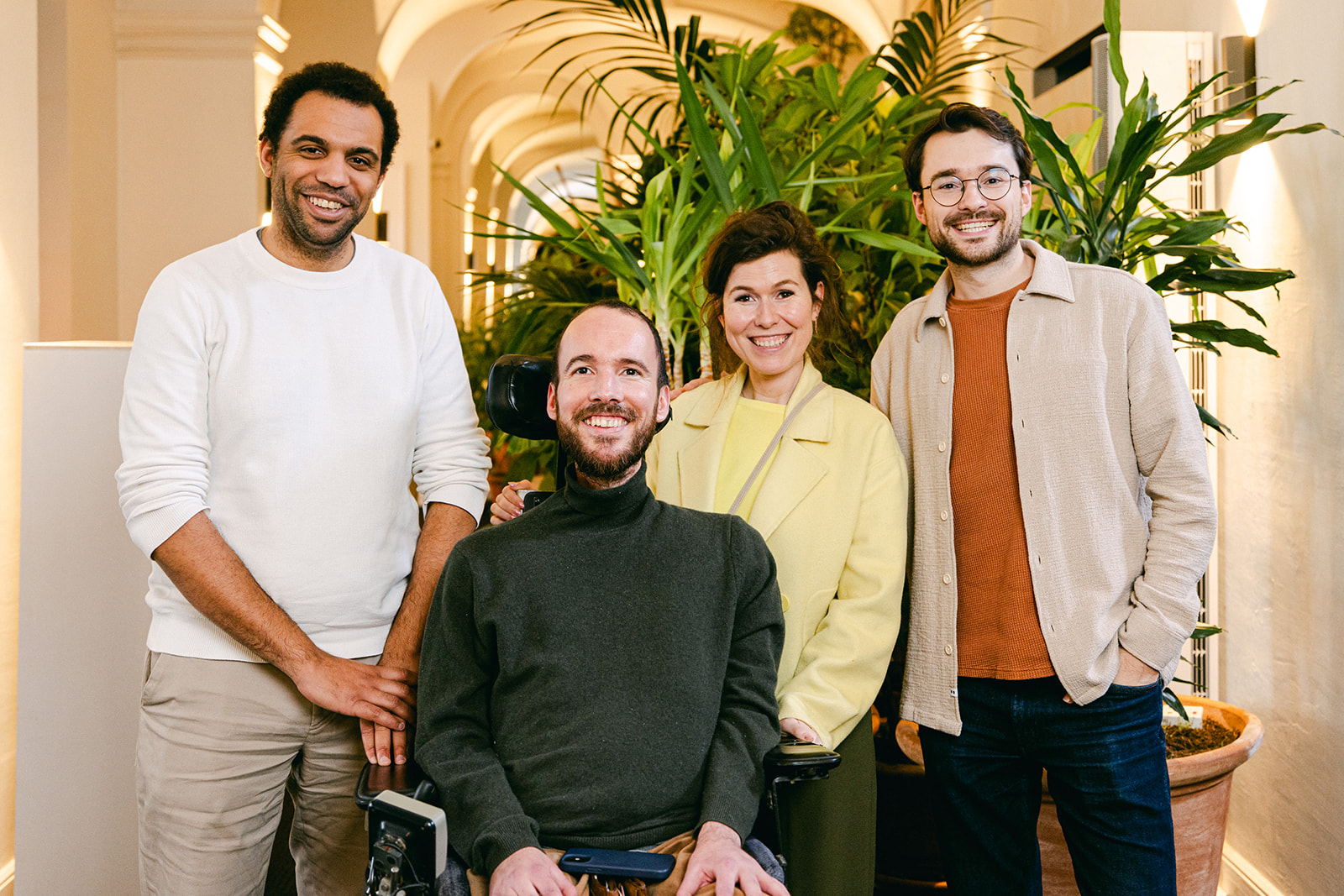
As the Co-Founder of d-teach, Lieselot is proficient in the world of AI and education. d-teach offers the first online school in Belgium and online training to help with the transition from offline to online learning. Nassim, an experienced data scientist, shares Lieselot’s interest in technology and used his knowledge and drive to co-found Flemar and Plusoperator. Anicet, Head of Nuclear Strategy, Innovation and Business Development at Tractebel and Louis, social entrepreneur in the field of sustainable development and impact education, are also both passionate about technology and education.
The team grouped together during the first Forum due to their shared passion, and immediately started brainstorming around the question What impact can we have together on society? “While projecting ourselves to 2030, it was quite easy to see AI playing a huge role in education. We started by identifying the gaps we see from now to then, how do we get there and what are the issues we will encounter?” Nassim recalls. According to the Fellows, digitalisation is a crucial component of society and teachers have an important role to play to enable students’ digital access. The group identified the gap between teachers and AI, with a lack of awareness and knowledge on how to use it in a beneficial and safe way. “AI is a tool that is coming, and we want to promote the positive side of this development. Teaching comes with a lot of administrative constraints, AI can decrease the burden on teachers. It can aid teachers to connect with their core mission: preparing young people for life after school and teaching them a practical way of using a tool that they will be confronted with in their professional life. Teachers can help students learn how to use AI, to understand it and to acquire skills required to use it safely, like critical thinking”, Anicet explains.
For the first half of the 40u40 program, the group worked on conducting research and preparing a survey to assess the gap between educators and AI. However, after the Field Work Day in February, they changed trajectory. During the Field Work Day, the Fellows were invited to present their work in progress to the 40u40 Co-Founders and Field Work Coach Sophie Limpens and exchange ideas to boost their impact. The feedback the AI for Education group received prompted them to use a faster, less resource-intensive bottom-up approach to have an impact. The idea to host an award raised to the surface to highlight best practices for the use of AI in education. Nassim remembers how “in a way, the stars just aligned at this point because Lieselot had the opportunity to host an event at the Belgian Economic Mission in Oslo that would be about education and AI. We decided to go for it, even though the timeline was super short with the event already happening in June.” With the help of two new team members, Koen Verlaeckt, Co-Founder of d-teach online school and Secretary General of the Flemish Interuniversity Council, and Steven Ronsijn, Education Policy Officer at Scholengroep Katholiek Onderwijs Gent, the group worked diligently over the next months to create the AI for Education Awards.
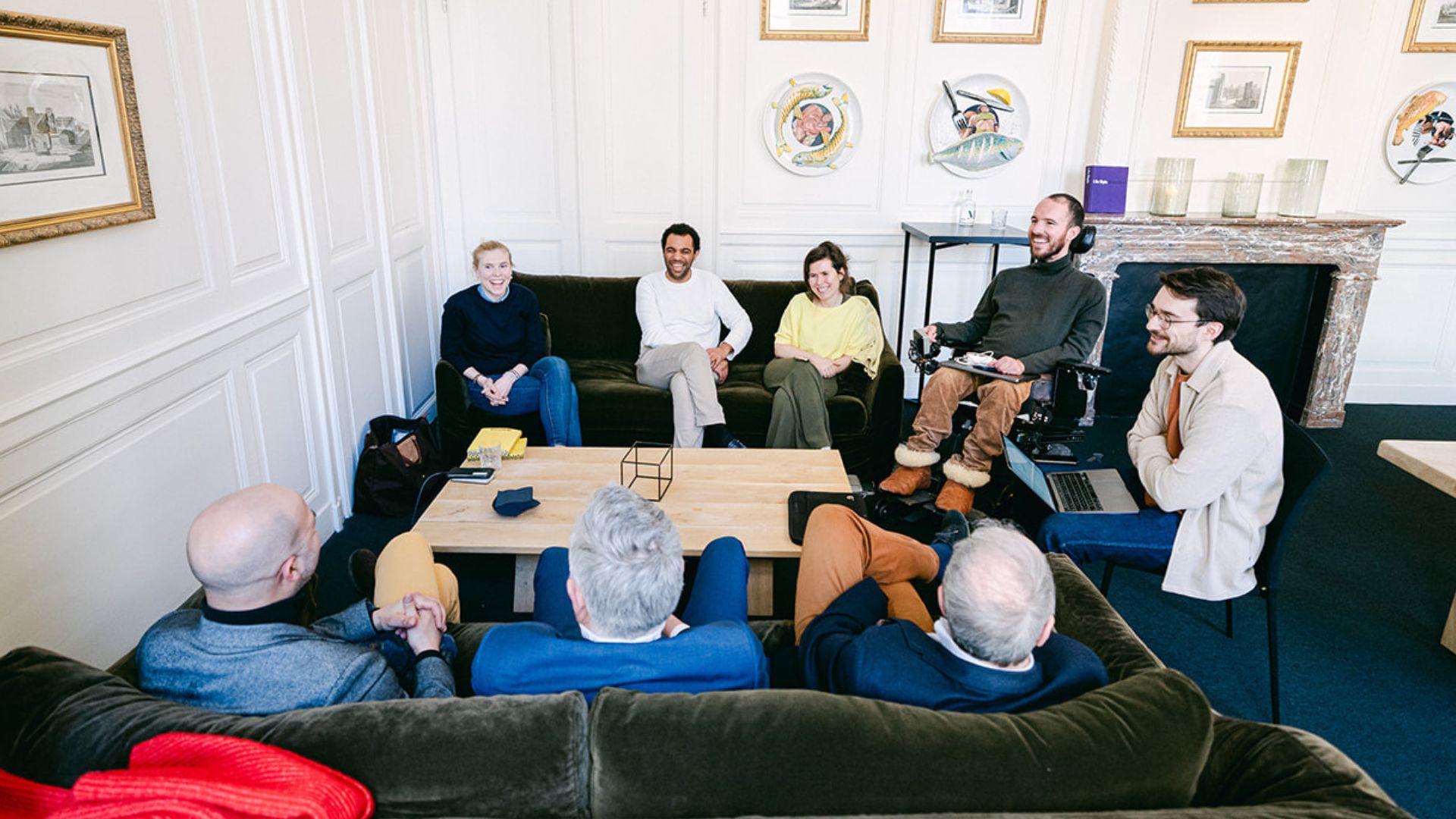
Nassim describes their mission as to “have an impact, and the way we want to achieve that is by communicating about the best practices of the use of AI in education, so others can take inspiration. To showcase these, we need to collect them, and we do that by hosting an award and thus attracting the best practices and then spreading the message.” After establishing their mission, they had to start building their brand, raising funds, assembling a jury and gathering admissions for the awards from all over Europe, and all of it within 10 weeks. They were supported by Lieselot colleagues, “d-teach connected very well with our purpose, their support was crucial and will also make it easier for us to sustain the project in the long run,” Nassim points out.
Once the online platform was ready, from mid-April to mid-May, the team received around 40 submissions from over 16 different European countries. They created three different categories for the Awards. The Learning Excellence Award acknowledges educators using AI to enrich their curriculum, create more inclusive and ethical learning environments, and improve teaching quality and effectiveness. “The other award is for organisations and programs empowering teachers to use AI by educating about AI or providing tools for educators to use it. It is called the Educator Empowerment Award,” Nassim explains. The third award category is the Special Belgian Award, handed over by Princess Astrid at the Award Ceremony. “We want to have an impact on Belgium, and since our network is in Belgium too, we thought it would be nice to communicate about a Belgian project as well,” Anicet says. The team assembled an international jury with professionals from the education sector to assess the applications. First, all submissions were read and a short list was created. Next, the jury, including the AI for Education team, reviewed all projects together. “We discussed the projects, what we liked about them, what impact we thought they had, and more,” Anicet recalls of the selection process. In June, the three laureates were announced during the Award Ceremony.
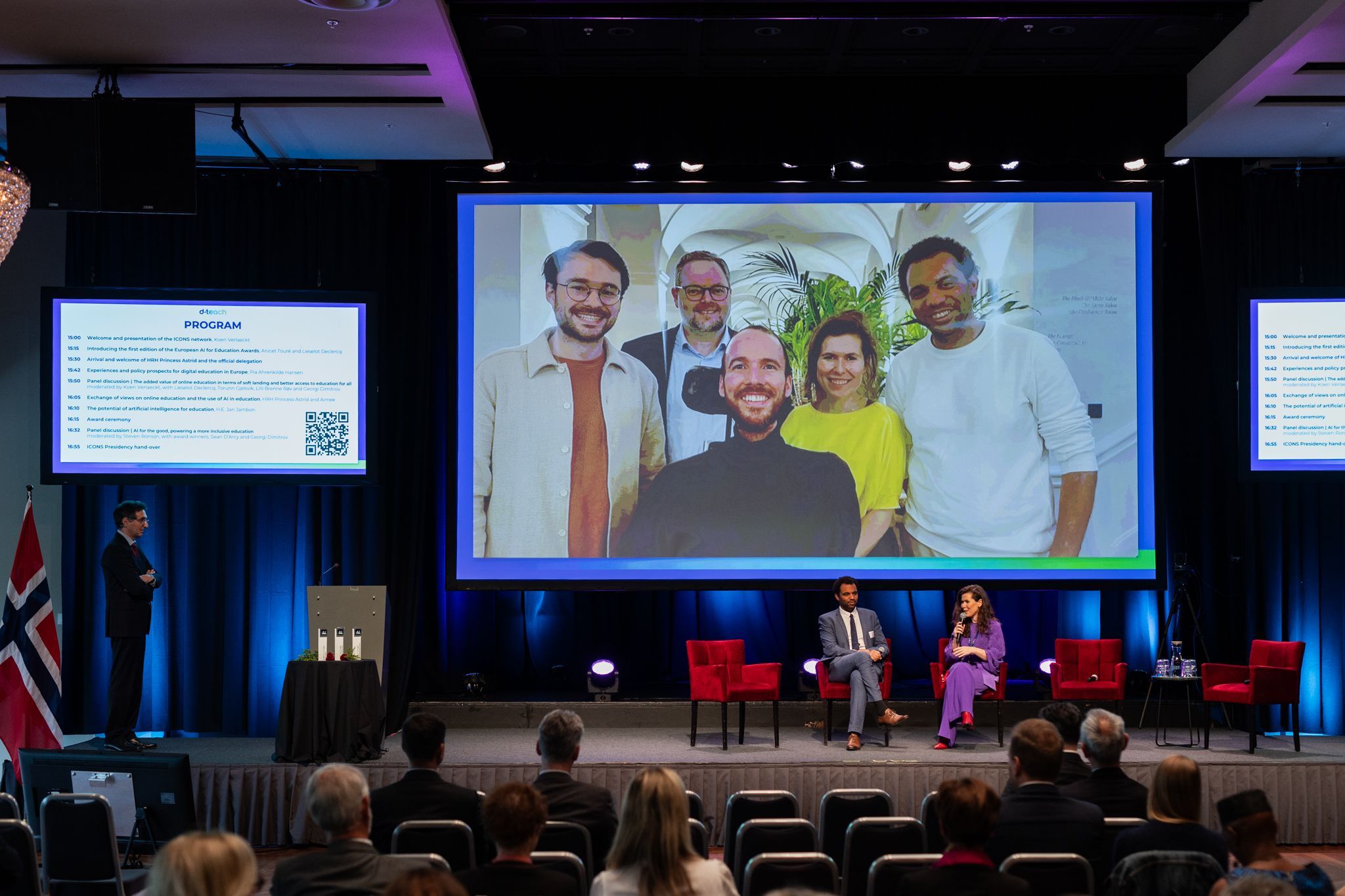
During the Belgian Economic Mission, the Icons Summit Empowering e-inclusive education worldwide, a conference powered by d-teach, the AI for Education Awards were introduced and presented. The event took place in person and was streamed online as well. Lieselot and Anicet were present in Oslo, “it was a great day, a beautiful location, many attendees, among other Princess Astrid of Belgium, Minister-President of Flanders Jan Jambon, and Minister of Foreign Affairs Hadja Lahbib, it was an impressive set-up,” Anicet recalls. Lieselot and he started the event by setting the scene with a small presentation about the idea and vision behind the AI for Education Awards, and how it started at 40u40. The second part of the event was devoted to the topic of online education for a better society with a panel discussion on the value of online education and an exchange of views on the matter between Princess Astrid and Aimee, d-teach’s virtual assistant. It followed the award ceremony where three winners and their runners-up were announced.
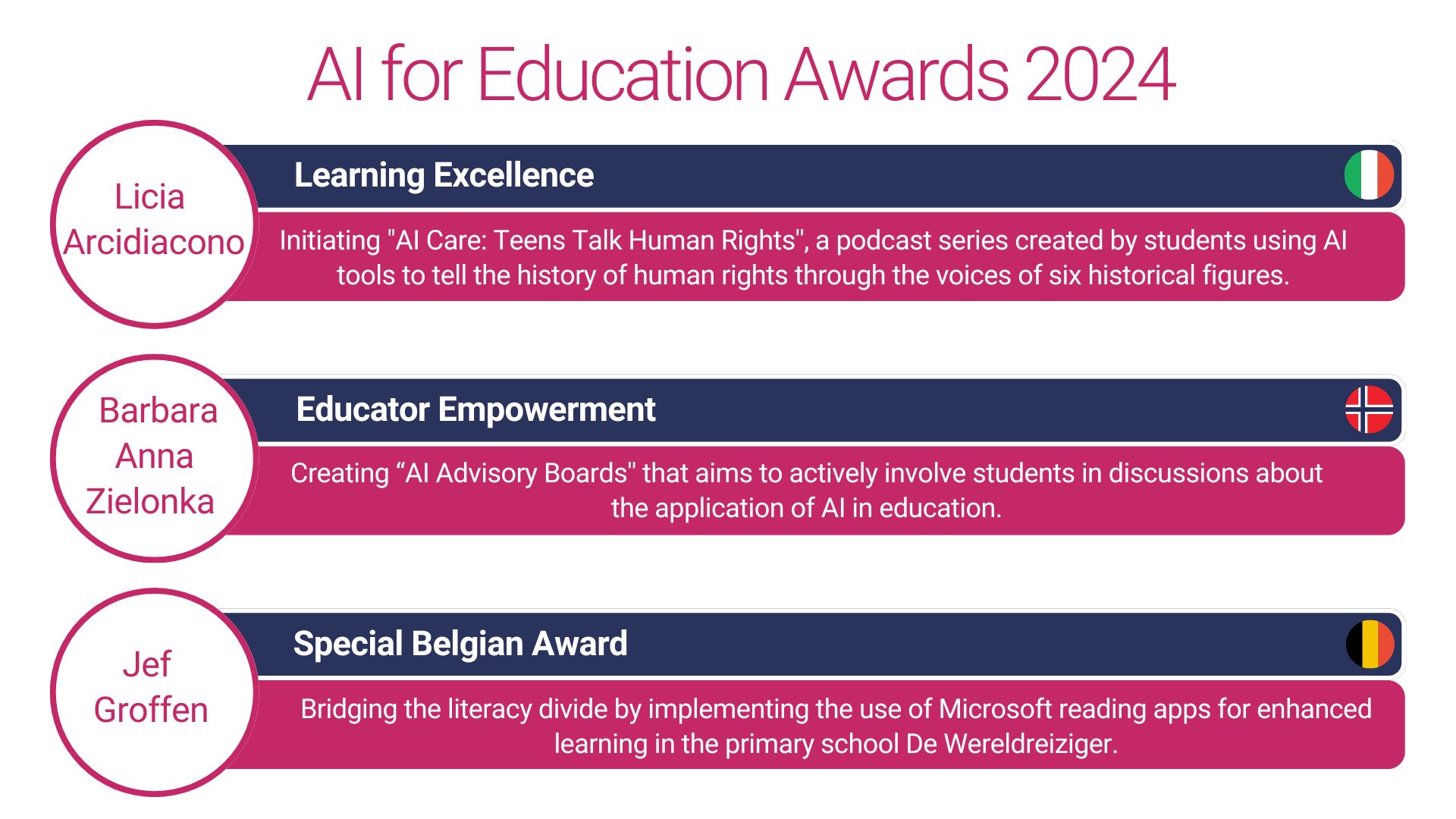
The event concluded with a panel discussion on “AI for good – Powering a more inclusive education”, where the laureates and organisations put their innovative use of AI in focus. For Anicet, the best parts about the Award Ceremony were the connections and conversations between people who pioneer in the use of AI in Education: “It was amazing getting to know the winners and supporters of the AI for Education Awards. To listen to their personal journeys and the challenges they face by using AI for education. They are not afraid to do something new, they are visionaries and being able to create connections and highlighting their positive stories, that’s the start of the impact we want to have!”
The first edition of the Awards was a resounding success, and the team is eager to keep the project going. “The goal is to have an impact on AI for educators, the awards are one of our means to do it, and we hope to organise a second edition next year. We want to make our initiative sustainable in the long term, to make our impact long lasting,” Nassim shares.
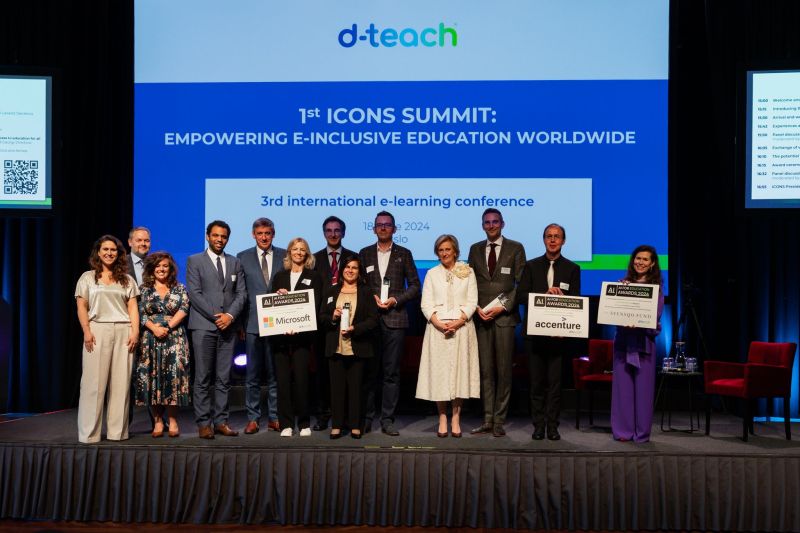
The main takeaways for the Field Work group are the successful launch of the awards, the new bonds formed with their co-Fellows who would become friends, and the new learnings they acquired by working on societal impact together. “One of my new insights was about teamwork, how to make it happen and the importance of a diverse team. We are a group of strong leaders in their own fashion, we had to work out how to manage ourselves, connect and bring each one’s individual qualities to the front,” Anicet shares. The Field Work group mastered this successfully, with each team member feeling acknowledged and valued, “it was a complementary team, we really clicked together,” Nassim says.
The second learning the group describes happened when they had to pivot after receiving feedback urging them to change trajectory. Anicet shares how they felt shaken after the Field Work Day, the group needed to act quickly to decide on the next steps. They managed to create a positive environment built on trust where courageous conversations could be held, enabling the team to quickly change directions for their project and achieve success. In hindsight, the team is proud and happy about how they overcame this challenge.
Last but not least, Anicet describes the intentional impact dimension of the Field Work project as his third, and main takeaway: “For me, one of the strong points of the Field Work was being able to be intentional about how you can have an impact on society. It translates for me to my professional and personal life as well, where I now put myself in a similar mindset, thinking about the concrete impact I can have.”
| Cookie | Duration | Description |
|---|---|---|
| cookielawinfo-checkbox-advertisement | 1 year | Set by the GDPR Cookie Consent plugin, this cookie is used to record the user consent for the cookies in the "Advertisement" category . |
| cookielawinfo-checkbox-analytics | 1 year | Set by the GDPR Cookie Consent plugin, this cookie is used to record the user consent for the cookies in the "Analytics" category . |
| cookielawinfo-checkbox-functional | 1 year | The cookie is set by the GDPR Cookie Consent plugin to record the user consent for the cookies in the category "Functional". |
| cookielawinfo-checkbox-necessary | 1 year | Set by the GDPR Cookie Consent plugin, this cookie is used to record the user consent for the cookies in the "Necessary" category . |
| cookielawinfo-checkbox-others | 1 year | Set by the GDPR Cookie Consent plugin, this cookie is used to store the user consent for cookies in the category "Others". |
| cookielawinfo-checkbox-performance | 1 year | Set by the GDPR Cookie Consent plugin, this cookie is used to store the user consent for cookies in the category "Performance". |
| CookieLawInfoConsent | 1 year | Records the default button state of the corresponding category & the status of CCPA. It works only in coordination with the primary cookie. |
| elementor | never | This cookie is used by the website's WordPress theme. It allows the website owner to implement or change the website's content in real-time. |
| JSESSIONID | session | New Relic uses this cookie to store a session identifier so that New Relic can monitor session counts for an application. |
| wpEmojiSettingsSupports | session | WordPress sets this cookie when a user interacts with emojis on a WordPress site. It helps determine if the user's browser can display emojis properly. |
| Cookie | Duration | Description |
|---|---|---|
| lang | session | LinkedIn sets this cookie to remember a user's language setting. |
| li_gc | 5 months 27 days | Linkedin set this cookie for storing visitor's consent regarding using cookies for non-essential purposes. |
| lidc | 1 day | LinkedIn sets the lidc cookie to facilitate data center selection. |
| Cookie | Duration | Description |
|---|---|---|
| _ga | 1 year 1 month 4 days | Google Analytics sets this cookie to calculate visitor, session and campaign data and track site usage for the site's analytics report. The cookie stores information anonymously and assigns a randomly generated number to recognise unique visitors. |
| _ga_* | 1 year 1 month 4 days | Google Analytics sets this cookie to store and count page views. |
| _gat_gtag_UA_* | 1 minute | Google Analytics sets this cookie to store a unique user ID. |
| _gcl_au | 3 months | Google Tag Manager sets the cookie to experiment advertisement efficiency of websites using their services. |
| _gid | 1 day | Google Analytics sets this cookie to store information on how visitors use a website while also creating an analytics report of the website's performance. Some of the collected data includes the number of visitors, their source, and the pages they visit anonymously. |
| CONSENT | 2 years | YouTube sets this cookie via embedded YouTube videos and registers anonymous statistical data. |
| Cookie | Duration | Description |
|---|---|---|
| li_alerts | 1 year | Description is currently not available. |
| Cookie | Duration | Description |
|---|---|---|
| bcookie | 1 year | LinkedIn sets this cookie from LinkedIn share buttons and ad tags to recognize browser IDs. |
| bscookie | 1 year | LinkedIn sets this cookie to store performed actions on the website. |
| IDE | 1 year 24 days | Google DoubleClick IDE cookies store information about how the user uses the website to present them with relevant ads according to the user profile. |
| test_cookie | 15 minutes | doubleclick.net sets this cookie to determine if the user's browser supports cookies. |
| VISITOR_INFO1_LIVE | 5 months 27 days | YouTube sets this cookie to measure bandwidth, determining whether the user gets the new or old player interface. |
| VISITOR_PRIVACY_METADATA | 6 months | YouTube sets this cookie to store the user's cookie consent state for the current domain. |
| YSC | session | Youtube sets this cookie to track the views of embedded videos on Youtube pages. |
| yt-remote-connected-devices | never | YouTube sets this cookie to store the user's video preferences using embedded YouTube videos. |
| yt-remote-device-id | never | YouTube sets this cookie to store the user's video preferences using embedded YouTube videos. |
| yt.innertube::nextId | never | YouTube sets this cookie to register a unique ID to store data on what videos from YouTube the user has seen. |
| yt.innertube::requests | never | YouTube sets this cookie to register a unique ID to store data on what videos from YouTube the user has seen. |